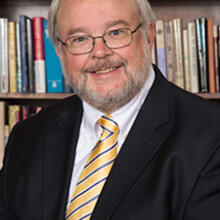Author’s note: One of the missing elements in the overwhelming coverage and commentary on the death of Pope Benedict XVI has been recognition of his leadership and legacy as a teacher of Catholic social doctrine. “Deus Caritas Est” and “Caritas in Veritate” are major social encyclicals. In my work as a leader of justice and peace efforts for the U.S. Conference of Catholic Bishops during Pope Benedict’s years as pope, I found that his writings deepened the foundations of Catholic social thought, strengthened the links between charity and justice and extended the tradition in major ways to care for creation. It also represents a major example of continuity and consistency among John Paul II, Benedict XVI and Francis.
In the following column, published in America immediately after Pope Benedict’s resignation, I suggested “faith in action is an overlooked part of Benedict’s legacy” (“The Pope They Missed,” March 11, 2013).
On the morning Pope Benedict announced his resignation, I was at a Catholic Charities program for people struggling with mental illness, addiction and homelessness. This example of faith in action is an overlooked part of Benedict’s legacy. In two of his three encyclicals, Benedict taught clearly and eloquently on the duty to care for the poor and vulnerable, declared “justice is the primary way of charity” and placed these obligations at the core of Catholic life: “Love for widows and orphans, prisoners, and the sick and needy of every kind is as essential to her [the church] as the ministry of the sacraments and preaching of the Gospel” (“Deus Caritas Est,” No. 15).
Later I watched news coverage of the announcement, which focused properly on its unprecedented nature, legitimately on the sexual abuse scandals and then predictably on Benedict’s teaching on abortion, same-sex marriage and a male, celibate priesthood. The pope and church were presented as out-of-touch opponents of the sexual revolution. It escapes some that opposing the destruction of unborn children and a redefinition of marriage does not make Benedict a conservative pope, but a Catholic pope. Sometimes I wonder who is more obsessed with sexual issues, the Catholic Church or American television.
Benedict’s greatest disconnection from U.S. elites may not be about sex, but social and economic life.
Benedict’s greatest disconnection from U.S. elites may not be about sex, but social and economic life: His advocacy for the life and dignity of the poorest and most vulnerable, his warnings to avoid military force in international disputes, his groundbreaking call for sacrifice to care for God’s creation and his warnings about “a selfish and individualistic mindset which finds expression in an unregulated financial capitalism.” These themes do not fit into poll-tested political messages about the middle class, the “makers, not the takers” and the avoidance of hard choices and sacrifice.
Washington sees events through its own narrow categories. It is both intrigued and appalled by a quick, secret election without declared candidates, polls or political consultants. At the White House in 2008, Benedict offered a different view:
The preservation of freedom calls for the cultivation of virtue, self-discipline, sacrifice for the common good and a sense of responsibility towards the less fortunate. It also demands the courage to engage in civic life and to bring one’s deepest beliefs and values to reasoned public debate.
Benedict consistently called for defending the lives and dignity of all. He insisted that “charity must animate the entire lives of the lay faithful and...their political activity, lived as social charity” (D.C.E.) and that “the market...must not become the place where the strong subdue the weak” (“Caritas in Veritate”). He taught that the church’s role in public life is inescapable, demanding and limited:
It is not the church’s responsibility to make this teaching prevail in political life.
Rather, the church wishes to help form consciences in political life and to stimulate greater insight into the authentic requirements of justice as well as greater readiness to act accordingly, even when this might involve conflict with situations of personal interest (D.C.E., No. 28).
For secular Washington, Benedict was the pope of no. For those who listened, Benedict is more the pope of and, connecting charity and truth, faith and reason, protection of life and the pursuit of justice, religious freedom and peacemaking, responsibilities and limitations of government and markets, care for creation and care for “the least of these.” For Benedict, there is “one teaching,” both moral and social.
The stories of resurrection I heard at Catholic Charities left me grateful to be a part of a faith community that does such lifesaving work. I wish I were part of a political community that sees our church and its retiring leader through more than issues of human sexuality. Our ecclesial, political and journalistic institutions all need to better reflect the “Caritas...love” that is at the heart of Benedict’s leadership, and now of his legacy.







